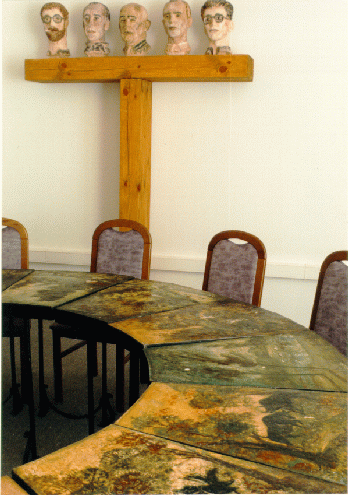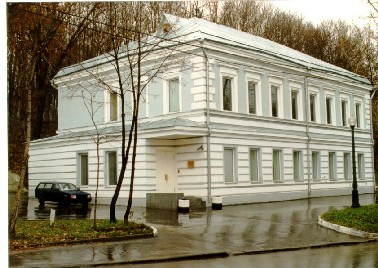
The Nobel Committee of the Norwegian Parliament has awarded Nobel's peace prize for 1975 to Andrei Sakharov. Sakharov's personal and fearless effort in the cause of peace among mankind serves as a mighty inspiration to all true endeavors to promote peace. Uncompromisingly and forcefully, Sakharov has fought not only against the abuse of power and violations of human dignity in all its forms, but he has with equal vigor fought for the ideal of a state founded on the principle of justice for all. In a convincing fashion Sakharov has emphasized that the individual rights of man can serve as the only sure foundation for a genuine and long-lasting system of international cooperation...
Sakharov's love of truth and strong belief in the inviolability of the human being, his fight against violence and brutality, his courageous defense of the freedom of the spirit, his unselfishness and strong humanitarian convictions have turned him into the spokesman for the conscience of mankind, which the world so sorely needs today.
Citation for the Nobel Peace Prize
Russia today sorely needs heroes. Argumenty I fakty polled 6,000 persons on their candidate for "Russian of the century". The majority failed to name anyone. Of those offering positive responses, 18% named Lenin, 13% named Sakharov and 10% named Stalin. No one else received 5% of the vote.
Russia today sorely needs to know its past. There is no museum in Russia, other than the Sakharov Museum, that presents the history of the Soviet era from a non-Communist perspective. The Sakharov Museum has made a brave beginning, but its exhibits must be expanded if it is to fulfill its function of educating the next generation of Russians about the USSR's totalitarian past.
Russia today sorely needs to develop a civil society. The Sakharov Center, rooted in the human rights movement of the 1970s and 1980s and Sakharov's ideals of tolerance, democracy, and civil liberties, can become a rallying point and support facility for Russia's proliferating non-governmental organizations.
The Center has been created by The Sakharov Foundation(Russia)/Public Commission. In September 1995 the City of Moscow gave to the Sakharov Commission a 25-year rent free lease on a 10,000-square-foot, two-storey building located in a handsome park across the Garden Ring Road from the The Sakharov Archives in Moscow. With the help of Freedom House, National Endowment for Democracy, and the USAID the renovation of the building has been completed in the spring of 1996 and since then the Center is actively working as a resource available to all human rights and non-governmental organizations in Russia.
In the past year Sakharov Center program achieved a number of its stated programmatic aims:
it became a viable research facility, with a functioning library and computer center;
it has become a training and education center for human rights and other reform-oriented NGOs;
in all over a dozen different NGOs used the center's facilities to conduct training, hold seminars, and organize press briefings and conferences (see Attachment Four);
it has attained a significant degree of visibility in the Russian media;
it has written, edited and prepared for publication a pamphlet on the Center, its exhibits, and programs;
its data bank contains information and extensive case studies of repression during the Stalin era as well as an "electronic map" of the Gulag, which also shows the railroads, canals and other structures built by prison labor;
it has become a special meeting place for former political prisoners;
it has become as important study center for the history of the human rights movement;
it has provided Russian teachers, primary school students, and college students with excursions to the Center and special lectures on the country's totalitarian past, the human rights movement, and democratic values.
Museum, Library and Computer Center

Center's garden and the Berlin Wall Monument
Center's garden and the Berlin Wall monument (gift from Check Point Charlie Museum in Berlin)
Over the past year, more than 6000 persons have visited the Sakharov Center's museum and its library or have participated in its meetings and seminars. In particular, in the ten months from October 1996 to August 1997 there were 46 excursion groups involving 1,214 teachers as well as secondary school and college students who received guided tours of the exhibits and special lectures.
The museum is open five days a week, and admission is free. The museum's permanent exposition is divided into three sections:
The USSR's Totalitarian Past, with special emphasis on the history of repression, the prison camp system, and the human rights movement;
Human Rights in Russia Today, including audiovisual displays on ethnic conflict in Chechnya, Tajikistan and other regions; and
The Life and Work of Andrei Sakharov.
In addition to permanent exhibits, the Museum hosted a number of temporary exhibitions. These included:
Yuri Rost's photographs of Sakharov and other Russian personalities;
the work of Doctors without Borders;
Women against Violence; and
Ernest Neizvestny's Magadan monument, Victims of Totalitarianism.
Typically, exhibits were accompanied by lectures and panel discussions.
The library, which is open to the public, contains 2,500 books and selected periodicals on human rights topics. More than 1,400 people visited and conducted research in the library. in the last ten months.
A computer facility in the Center, which can be used by human rights groups, contains several computers linked to the Internet.
Meetings and Activities

The Round Table meeting room at the Centre
The Sakharov Center has become a meeting place and rallying point for a rapidly increasing number of human rights NGOs from Moscow and beyond: Common Action, an umbrella group for Moscow human rights activists; the Moscow Helsinki Group; the Memorial Society; Moscow Research Center for Human Rights; Sisters, a women's rights group; the Moscow Center for Prison Reform; the Mordovian organization "Mastoba"; the Chechen cultural organization "Lam"; the Moscow Human Rights Commission; et al.
In the ten months between October 1996 and August 1997 1950 participants attended public events at the Center such as seminars, lectures, press briefings, etc.
On April 15, 1997, Amnesty International conducted a press conference at the Center on conditions of detention in Russia.
In October 1997, the Sakharov Center hosted a conference with the International League for Human Rights and the Global Survival Network on the trafficking of Russian Women.
In collaboration with Freedom House, The Sakharov Center has conducted a conference on Russian Ukrainian relations with participation of Russian, Ukrainian and American experts.
In December 1996 and March 1997, the Sakharov Center conducted round-table discussions with Georgian and Abkhazian journalists, politicians, and intellectuals in hopes of initiating a constructive dialogue. Members of LAM, a Chechen cultural organization in Grozny, conducted together with Russian intellectuals, a discussion and press briefing on the postwar revival of Chechen cultural institutions. Sakharov Center staff assisted the Chechens in preparing and presenting a grant proposal to TACIS, the European Union's assistance program for Russia.
In January 1997, in the course of an official visit to Moscow, Natan Sharansky, formerly political prisoner in the USSR and now Israel's Minister of Industry and Trade, visited the
Sakharov Foundation and Center to meet with Russian friends from the human rights movement and to conduct a press conference. David Remnick (The New Yorker, August 11, 1997) has described Sharansky's regard for Sakharov: "In his ministry office, Sharansky hung a portrait of his "higher authority" - Andrei Sakharov, his mentor in the Soviet human rights movement. The portrait is there as a reminder of Sakharov's example: his honesty, the purity of his intentions and of his language. "His expression was like a saint's - straight, pure, clear, moral thought," Sharansky said. "This connection of simplicity and directness with his greatness, it was from the heavens."
In February 1998, the Sakharov Center in collaboration with the American consulting firm A.T. Kearney is scheduled to hold a meeting on potential sources of funding for Russian cultural institutions.
Other programs include:
- civil dialogue on current issues such as displaced persons, alternate service for draftees, prison and sentencing reform, and the functioning of the judicial system
- lectures and discussions on the history of the gulag
- concerts, lectures, and other events designed to popularize the ideas of Andrei Sakharov.
